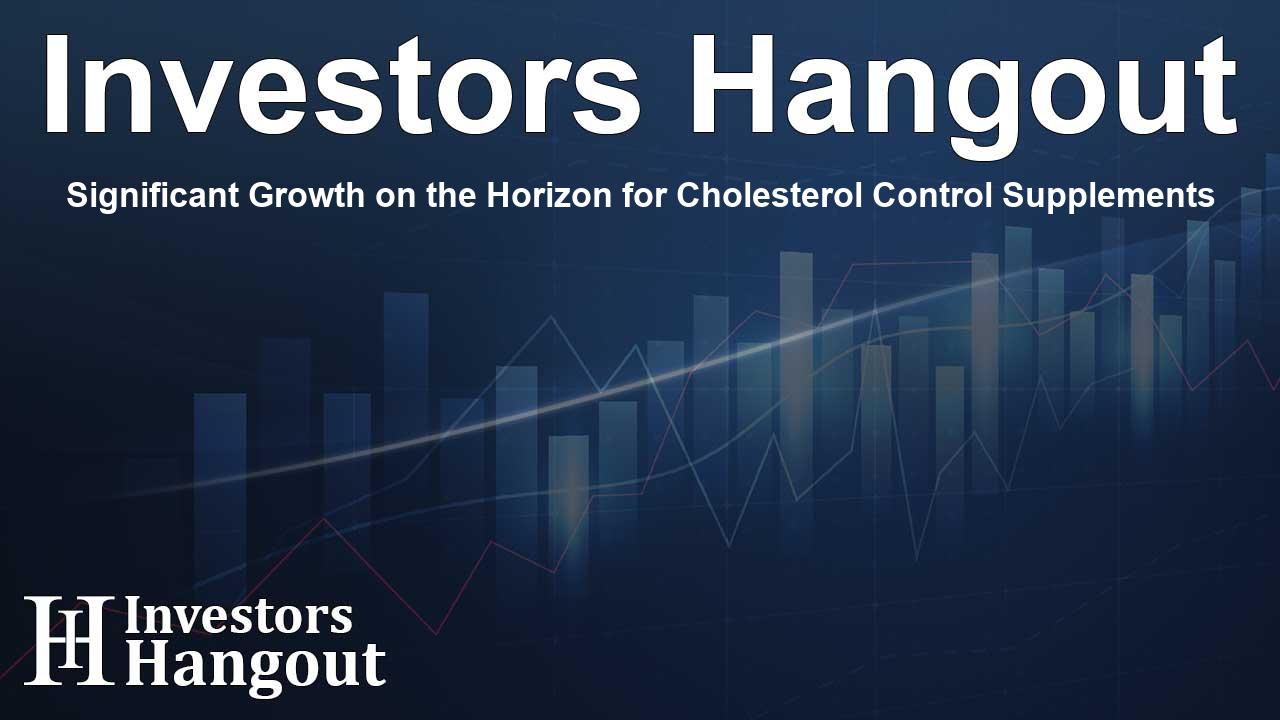Significant Growth on the Horizon for Cholesterol Control Supplements

Cholesterol Control Supplements Market Overview
The cholesterol control supplements market is set to experience notable growth, projected to reach USD 1,540.67 million by 2034, with a CAGR of 4.6%. This upward trend is largely fueled by a rising awareness regarding cardiovascular health and a significant shift towards preventive care among consumers.
Product Diversification in the Market
One of the primary drivers of this market growth is product diversification. Manufacturers are increasingly offering a wide array of supplements that include natural ingredients such as omega-3 fatty acids, plant sterols, and soluble fiber, all known to effectively impact cholesterol levels. Furthermore, there is a remarkable rise in demand for plant-based and vegan supplement options as health-conscious individuals and those following alternative diets are populating the consumer base.
Consumer Preferences
A recent survey indicates that about 65% of consumers are inclined towards natural, plant-based supplements rather than synthetic alternatives. This shift reflects an overarching movement towards holistic health solutions and drives the demand for effective cholesterol management products.
Innovation and E-Commerce Impact
Innovative strategies that focus on research and development are also contributing to market expansion. Companies are dedicated to creating more effective formulations that not only target lowering LDL (bad cholesterol) but also aim to raise HDL (good cholesterol). Moreover, the growth of e-commerce has simplified the purchasing process for consumers. Findings show that nearly 48% of consumers now acquire cholesterol control supplements online, highlighting the vital role digital platforms play in widening product accessibility.
Sustainability in Supplement Production
As sustainability becomes paramount, both manufacturers and consumers are showing a preference for eco-friendly products. Companies have started adopting sustainable practices, including using eco-friendly packaging and sourcing ethically as 58% of consumers express a willingness to pay a premium for products with these desirable characteristics.
Key Growth Drivers
Several critical factors contribute to the ongoing growth of this market:
Awareness of Cardiovascular Health
Given that cardiovascular diseases remain one of the leading causes of mortality across the globe, there's an escalating demand for preventive supplements aimed at reducing risks. Statistics reveal that approximately 17.9 million deaths occur annually due to heart conditions as reported by health authorities.
Natural Product Preferences
Consumers increasingly gravitate towards natural supplements that boast clinical backing, such as omega-3 fatty acids and soluble fiber. It is noted that 68% of consumers show a preference for these natural products, with 45% ready to invest more in efficacy-backed solutions.
Market Competition and Trends
The competition within the cholesterol control supplements sphere accentuates a partnership between private labels and multinational corporations (MNCs). Private labels cater to cost-sensitive consumers by offering budget-friendly options, while MNCs prioritize innovation, robust marketing campaigns, and clinical validation to bolster brand reputability and consumer trust.
Recent Product Innovations
The market is poised for innovation with recent launches like Valbiotis’s Lipidrive®, aimed at managing cholesterol levels, and Nutrartis releasing Cardiosmile Plant Sterols in liquid form. These additions highlight a continued commitment to addressing consumer needs in the realm of cholesterol management.
Future Market Insights
As highlighted by industry experts, the cholesterol control supplements market is anticipated to maintain its robust growth trajectory due to evolving consumer preferences and increased health awareness. As new products emerge and marketing strategies evolve, the industry appears poised for substantial future expansion.
Frequently Asked Questions
What drives the growth of the cholesterol control supplements market?
The growth is primarily driven by increasing awareness of cardiovascular health, product diversification, and a significant shift towards preventive care among consumers.
How much is the cholesterol control supplements market projected to grow?
It is projected to reach USD 1,540.67 million by 2034, with a CAGR of 4.6% from current estimates.
What trends are shaping consumer preferences in this market?
A notable trend includes an increasing preference for natural and plant-based supplements, driven by health consciousness and holistic solutions.
How does e-commerce impact the accessibility of supplements?
The rise of e-commerce has made it easier for consumers to purchase cholesterol control supplements, with a significant percentage of purchases now occurring online.
What sustainability practices are being adopted?
Manufacturers are increasingly focusing on sustainability by utilizing eco-friendly packaging and ethically sourced ingredients, appealing to environmentally conscious consumers.
About Investors Hangout
Investors Hangout is a leading online stock forum for financial discussion and learning, offering a wide range of free tools and resources. It draws in traders of all levels, who exchange market knowledge, investigate trading tactics, and keep an eye on industry developments in real time. Featuring financial articles, stock message boards, quotes, charts, company profiles, and live news updates. Through cooperative learning and a wealth of informational resources, it helps users from novices creating their first portfolios to experts honing their techniques. Join Investors Hangout today: https://investorshangout.com/
Disclaimer: The content of this article is solely for general informational purposes only; it does not represent legal, financial, or investment advice. Investors Hangout does not offer financial advice; the author is not a licensed financial advisor. Consult a qualified advisor before making any financial or investment decisions based on this article. The author's interpretation of publicly available data shapes the opinions presented here; as a result, they should not be taken as advice to purchase, sell, or hold any securities mentioned or any other investments. The author does not guarantee the accuracy, completeness, or timeliness of any material, providing it "as is." Information and market conditions may change; past performance is not indicative of future outcomes. If any of the material offered here is inaccurate, please contact us for corrections.